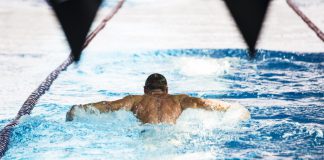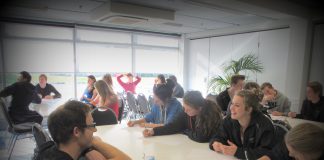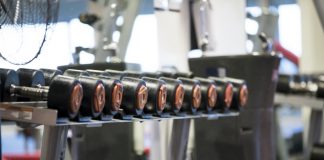It’s no secret that Kiwis love their rugby, and AUT Millennium is right behind our local North Harbour team as they battle against other provinces from around the country during the Mitre 10 Cup. Given our commitment to health, wellness and sport in our local community, we’re proud to be able to provide a home for the squad during their busy season.
The relationship between AUT Millennium and North Harbour Rugby began around four years ago, when the Union approached AUT Millennium for expertise in strength and conditioning. At the time, Alex King was working within the Athlete Development programme, providing age-appropriate strength and conditioning for youth athletes. With a professional rugby background, it seemed like a perfect opportunity for Alex to combine his playing experience with his Bachelor of Sport and Recreation in coaching. Having played to high levels in New Zealand before taking up contracts in the UK and Hong Kong, he’s familiar with the demands on professional players and their bodies. His first year as the squad’s Strength and Conditioning Coach went pretty well – Harbour won the Championship in the 2016 season.
When they’re on site, the squad makes use of all facilities depending on where they’re at in their schedule. From weight training to pool recovery, and meeting rooms for match reviews and previews, AUT Millennium offers the team a chance to prepare for each game close to their home ground of North Harbour Stadium. The team operates on a seven-day cycle centred around game day, with recovery, weights and field sessions worked into their schedule. Due to the nature of the season, turnarounds can differ in length, keeping Alex on his toes. “It’s my job to keep as many bodies on the field as possible, so I make sure that recovery is taken care of no matter how long our turnaround is. The boys love the shorter turnarounds because it means less heavy training,” he laughs.
One thing Alex has learned over his time with North Harbour is to keep things fresh. “Rugby is these guys’ job, they’ve been doing it for years, and doing the same thing over and over can become boring if you’re not careful,” he tells. “I like to keep it fresh and to make it fun. We’ve done water polo for recovery, and they do Deep Water Running as well. That’s something I learned from Athlete Development, actually. It’s a lot harder to keep an eight year old or teenager engaged and keen than it is for a professional athlete, so I wasn’t short on creative ways to keep them interested.”
The state of provincial rugby
The franchised Super Rugby competition garners the most money and attention in the rugby calendar, given leading All Blacks players are available for the majority of the season, and its place as an international competition. Despite this, there is something special about the Mitre 10 Cup, which pulls on the parochial heartstrings of rugby fans. For many regions, it’s their only opportunity to be represented locally, rather than lumped in as part of a franchise’s catchment area. “I like to say that Mitre 10 Cup is a young man’s game,” Alex laughs. “With the exposure of First XV rugby these days, there’s a lot of boys coming straight out of school and into a Mitre 10 Cup squad. The average age across the competition is probably between 19 and 22.”
North Harbour have a dedicated focus on growing the game in their local region, which spans from Northcote to Mahurangi. “This year in particular, we’ve put a huge emphasis on selecting from within the region,” he tells. “In our current squad, there are perhaps two or three who are outside the province, and everyone else has been involved with North Harbour previously or has been selected out of local club rugby. Our initiative is to grow our people, and we want to help the boys within our community reach their rugby goals.” For many, that’s a Super Rugby contract, although it may also be lucrative contracts with European or Japanese clubs.
Because of the Super Rugby season, Alex doesn’t get much time to work with the players who feature in both competitions, although most report for provincial duty in good condition following a short break. “Mitre 10 Cup is much more of a sprint, whereas Super Rugby is a marathon,” Alex tells, referencing the comparatively short season. The squad comes together at the end of July before the season kicks off in August. “All of our processes are more condensed, but we have a good routine to make sure we’re getting the best out of every member of the squad.” Throughout the season, Alex is in contact with his counterparts at Super franchises around the country. They touch base to see how a particular player is doing, what he’s working on and with requests for Alex to address any concerns. “We do transition handovers and go through the whole year for each player, what they’ve done numbers-wise and what we need them to achieve,” Alex says. “They offer advice and see if there’s anything they can do to help us.” This network of strength and conditioning coaches is one way Alex develops on a professional level. Being based at AUT Millennium also gives him the chance to rub shoulders with coaches accompanying athletes or teams who train on site, such as Rugby Sevens, NZ Breakers and domestic netball sides.
Outside of Mitre 10 Cup season, Alex’s role doesn’t stop. He’s often found at AUT Millennium at 4.30am, working with emerging players on the cusp of making the following season’s squad. These players have full time commitments, often as tradies or students, so the early starts are a must. “Three times a week they’re here with me early,” Alex says. “These are the guys who are really pushing for spots not taken by Super Rugby players. They train with me, they go to work, then they have club training or are back with us at Harbour for pathways training later in the day. It’s a big commitment, but they want to be a professional rugby player, so there has to be some sacrifice to get there.”
Commitment to the Harbour community
The Union was in the media earlier in the year for their decision to disregard youth representative programmes and focus more on growing involvement and skills within the game. Alex is emphatic about the impact this is having on younger players. “The focus is then on every kid who is playing rugby, regardless of how good they are for their age,” he says. “We want to develop them to become better people as well as better rugby players. Our junior numbers are increasing, so it’s working, and our hope is that as many of those boys and girls stay involved in the game for as long as possible because of that approach.”
Involving the community with the Union as much as possible extends to university students who want to follow in Alex’s footsteps. He has taken the opportunity to bring interns into the environment so they can be exposed to the demands of professional sport and witness how their studies are applied practically. It’s something he’s passionate about. “I’ve had the opportunity to grow and develop in this role, but it’s great to be able to give that to others as well,” he shares. “I’ve had interns work with us who have gone on to some great roles when they’ve graduated – one is with the Warriors, a couple are working in the UK, and some are doing postgraduate studies to deepen their knowledge.” With AUT’s Sport and Recreation programme having a base at AUT Millennium, it’s a no-brainer connection which benefits both parties and provides great opportunities to the next generation.
Alex encourages the AUT Millennium community to come along to games. He also highlights the work being done for the women’s game. “We’ve got great women’s pathways, and our women’s rep side are developing in the Farah Palmer Cup competition as well,” he says. “There are home games which are double headers with the women’s competition, so those will especially be good ones to come along to.” With high school rugby and junior club teams often involved in pre-match or half time entertainment, and children encouraged to go on to the field for photos and autographs after each game, there is a true sense of community on game day. “It’s something we’re genuinely committed to,” Alex emphasises.
With a healthy squad and promising form, Alex is encouraged by what the squad is capable of this season. “Our goal is to push for a top four spot and see what happens after that,” he says. “We’re healthy and well prepared, and that’s what’s needed to succeed.”
This piece first appeared in our Spring Flame magazine.






































